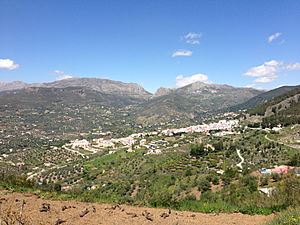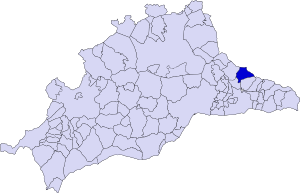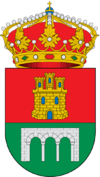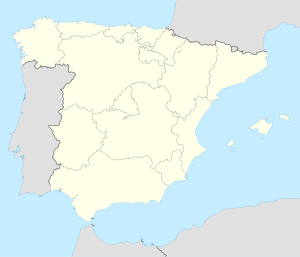Alcaucín facts for kids
Quick facts for kids
Alcaucín
|
||
|---|---|---|
|
Municipality and town
|
||
 |
||
|
||

Municipal location in Málaga Province
|
||
| Country | ||
| Autonomous community | Andalucía | |
| Province | Málaga Province | |
| Comarca | Axarquía - Costa del Sol | |
| Area | ||
| • Total | 18 sq mi (46 km2) | |
| Elevation | 1,699 ft (518 m) | |
| Population
(2018)
|
||
| • Total | 2,239 | |
| • Density | 117.5/sq mi (45.37/km2) | |
| Time zone | UTC+1 (CET) | |
| • Summer (DST) | UTC+2 (CEST) | |
| Website | http://www.alcaucin.es | |
Alcaucin (pronounced al-kow-THEEN) is a charming town in southern Spain. It's located in the province of Málaga, which is part of the Andalucía region. This municipality is quite close to the border of the Granada province.
Alcaucín is about 54 kilometers (around 33 miles) from the big city of Málaga. It's also about 507 kilometers (315 miles) from Madrid, the capital of Spain. The name Alcaucín comes from the Arabic word al-kautín, which means "the arches."
As of 2018, about 2,239 people live here. Some residents also live in a smaller area called Puente Don Manuel. People from Alcaucín are called Alcaucineños. They also have a fun nickname: tiznaos, which means "smudged" or "sooty."
Contents
Exploring Alcaucín's Geography
The village of Alcaucín is in the northern part of a region called Axarquía. It sits between the Sierra de Alhama and Sierra de Tejeda mountains. There's also a special mountain pass here called the "Boquete de Zafarraya." This pass is very important in the Axarquía mountain area.
To the east, Alcaucín borders the Sierras of Tejeda, Almijara and Alhama Natural Park. This park is known for its beautiful nature. The land here can be very steep. For example, the Maroma mountain is 2,066 meters (6,778 feet) high, but then the land quickly drops to 200 meters (656 feet) in Puente Don Manuel. The area around Alcaucín is mostly covered in thick forests.
Plants and Animals of Alcaucín
Alcaucín is home to many different kinds of plants and animals. It's one of the richest natural areas in the Axarquía region.
Trees and Shrubs
The most common trees you'll see are pine trees, especially Aleppo pines. These forests are being replanted to help them grow. Other trees include poplars, cedars, oaks, and cypress. You can also find shrubs like terebinth, gorse, jaguarzos, ivy thickets, and vines. Herbs like thyme, rosemary, palmitos, and torviscos also grow here.
Higher up, closer to the "Senos de la Tejada" area, the pine trees become less common. Instead, you'll find larger shrubs like juniper, savin, hawthorn, and yew trees. Yew trees are not as common now, but you can still spot them on some cliffs on the north side of Sierra Tejada.
Wildlife
The most easily spotted animal in this area is the mountain goat. If you look closely in the denser parts of the forest, you might also see weasels, bobcats, badgers, and genets.
Many different birds live here too. Some common birds include the linnet, blackbird, warbler, redstart, skylark, and nightingale.
A Glimpse into Alcaucín's History
The name Alcaucín comes from Arabic, al-qawsayn, meaning "The Arcs." Some people think this name came from an old aqueduct, which is like a bridge for water. Others believe it's because there were many yew trees. The wood from yew trees was used to make hunting bows, which are shaped like an arc.
Alcaucín is one of the oldest inhabited places in Málaga. In 1983, during excavations in the "Boquete de Zafarraya," scientists found human remains. These included a jawbone that belonged to a Neanderthal man! This shows that people lived here a very long time ago.
Later, during the time of the Phoenicians, they started building a fortress called Zalía. But it was the Arabs who built the castle we see today. The Catholic Monarchs conquered this castle in 1485.
In 1884, a big earthquake hit the area on December 25th. In Alcaucín, 134 houses collapsed. Six people died and five were seriously injured in the main town. In the surrounding areas, 112 houses fell, and three more people died. Many other buildings were also badly damaged.
See also
 In Spanish: Alcaucín para niños
In Spanish: Alcaucín para niños
 | May Edward Chinn |
 | Rebecca Cole |
 | Alexa Canady |
 | Dorothy Lavinia Brown |



